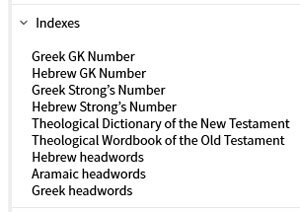I have noticed that my library defaults to "Enhanced Strong's Lexicon" for Strong's numbers, even though my library has many resources that might be considered preferable.
For Louw Nida numbers, it uses Louw Nida.
I am assuming that unless you configure it otherwise, the software uses default resources for the different type of look-ups? Is this because they want to use common resources that are in the base packages?
This is the index info shown under info for the "Enhanced Strong's Lexicon".

How would I display all the resources in my library which are indexed with Strong's numbering? And with Louw-Nida numbering.
And if needed, then filter those further down to "Lexicon" type resources?
So what I would have shown in the Library then would then be every available resource which could replace the default.
I'm sure it can be done but I don't know how yet 